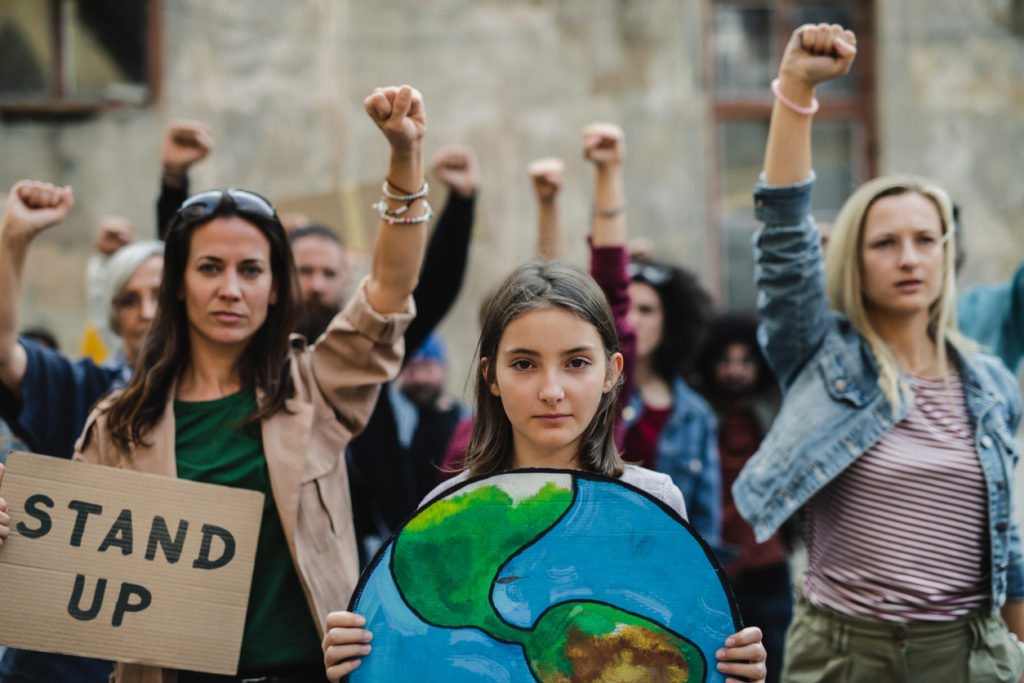Glasgow/New York, November 5 – Thousands of young climate activists, so far the largest crowd of protesters in the Scottish city of Glasgow, took to the streets to demand actions against climate change. Headed by Swedish teen activist Greta Thunberg, the young activists called the UN global climate summit “a failure” and brandished signs calling for an end of deforestation and for saving the planet from climate dangers.
But Glasgow is expecting a much larger protest Saturday November 6 as tens of thousands of climate activists are prepared to demonstrate as part of the “Global Day for Climate Justice” organized by Cop26 Coalition. The demonstrations demand that the 197 governments that are holding the 26th UN global climate summit work out effective and just measures against climate change.
More than 25,000 people have registered to attend the climate summit, which the UN considered its most important one as global warming is threatening the earth with more climate disasters such as flooding, severe draught and wildfires. The organizers said over 200 simultaneous events are set to take place around the world, with over 100 in the United Kingdom alone.
With such large crowds in Glasgow, COP26 Coalition has provided guidelines to all participants to take measures against Covid-19 including testing, wearing facial masks and social distancing.
“Public health and safety during the ongoing pandemic is our primary concern,” the guidelines said. “We have planned all activities over COP26 to minimise the risk of spreading Covid-19. We are fighting for climate justice at COP against the backdrop of global vaccine inequality and a need to keep everyone in our communities – both in Glasgow and abroad – safe.”
The Global Day for Climate Justice organization said in its website, which provided also details for the demonstrations, said:
“The Era of Injustice is Over: Our Time is Now”
“Justice won’t be handed to us by world leaders or delivered by corporations. So far, governments have done too little too late: colluding with corporations and hiding behind green washed ‘solutions’ that actually don’t exist yet, that don’t address the scale of the problem, and in many cases rely on more exploitation of people and the planet.
“The transformative solutions that we need to survive and build a more just and fair world can only be brought about through collective action, solidarity and coordination, from our local communities and international levels. We are bringing together movements from across the world to build power for system change – indigenous movements, frontline communities, trade unions, racial justice groups, youth strikers, land workers, peasants, NGOs, grassroots community campaigns, feminist movements, faith groups.”
“Wherever you are in the world, now is the time to join the fight for climate justice. We need all hands on deck: in workplaces, communities, schools, hospitals and across national borders.”
Asad Rehman, a spokesperson for the COP Coalition, told the 350.org, a climate organization present in Glasgow that civil society groups had little access to the climate summit.
“We are taking to the streets across the world this weekend to push governments from climate inaction to climate justice,” Rehman said. “This has been the least accessible climate summit ever – with so many people sidelined at the talks or not able to make it in the first place. Today those people are having their voices heard.”
“The climate crisis has resulted from our broken, unequal societies and economies. We must transform our global economies into ones that protect both people and our planet instead of profit for a few.”
Brianna Fruean, a Samoan member of the Pacific Climate Warriors delegation and a speaker at the rally on Saturday, said:
“As someone from one of the regions most threatened by climate breakdown I know just how important this climate summit is, and how crucial it is that voices are heard on the streets as well as the corridors of power. For a decade now, the storms in the Pacific have been getting more violent, the droughts have been longer and the floods deeper. Fishers cannot feed their families. Family-owned shops that are flattened in a cyclone are rebuilt, only to be destroyed by rising water.”
“That’s why I’m marching today – with people right across the world – because it can’t go on like this. We refuse to be just victims to this crisis. We are not drowning, we are fighting and on Saturday the world will hear us.”
United Nations correspondent journalists – United Nations correspondent journalists – United Nations correspondent journalists
United Nations journalism articles – United Nations journalism articles – United Nations journalism articles

